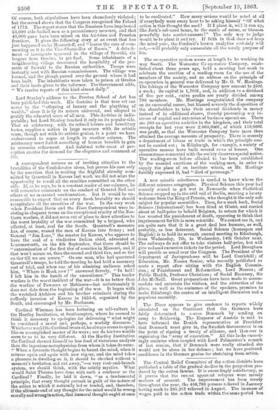A correspondent accuses us of inviting attention to the brutalities
of the Confederates alone, but proves his case only by the assertion that in reciting the frightful atrocity com- mitted by Quantrell in Kansas last week we did not seize the opportunity to recall all the cruelties committed on the other side. If, as he says, he is a constant reader of our columns, he will remember comments on the conduct of General Neil and others of no measured condemnation. But it would be un- reasonable to expect that on every fresh brutality we should recapitulate all the atrocities of the war. In the very week when President Davis and the Times Correspondent were in- sisting in eloquent terms on the exceptional cruelty of the Nor- thern warfare, it did not seem out of place to draw attention to the worst brutality of the war committed by a brigand, who affected, at least, zeal for the South. Quantrell's massacre has, of course, roused the men of Kansas into frenzy ; and General "Jim Lane," the senator for Kansas, who appears to have the soul of a vindictive Indian chief, advocated at Leavensworth, on the 8th September, that there should be "extermination of the first tier of counties in. Missouri, and if that won't secure us, then the second and third tier, and so tier on tier till we are secure." On one man, who had quartered Quantrell's troops, he told the meeting he had held a summary sort of trial, and when one of his admiring audience asked him, "Where is Hook now ? " answered fiercely, "In hell ! I left him in the hands of the executioner." This border. warfare is the worst incident of the war—it is no better than the warfare of Pawnees or Mohicans—but unfortunately it does not date from the beginning of the war. It began with the wretched Atchison and his brother criminals during the ruffianly invasion of Kansas in 1855-6, organized by the South, and encouraged by Mr. Buchanan.






























 Previous page
Previous page